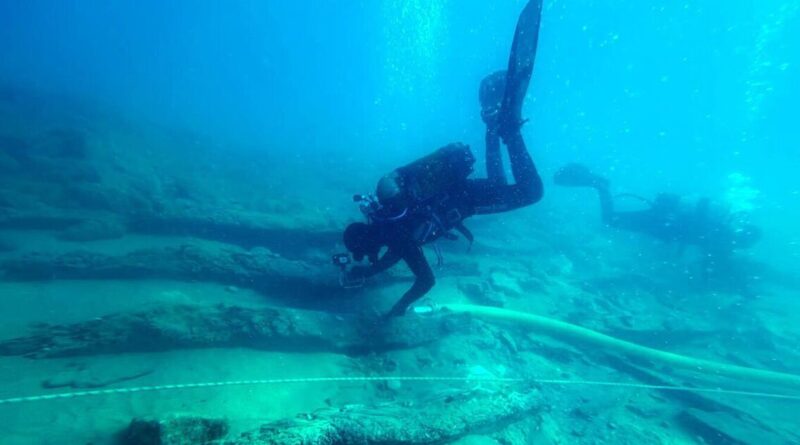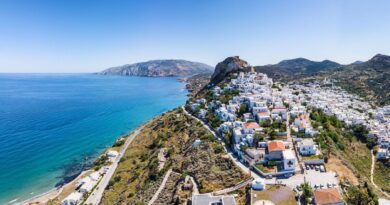Ancient shipwreck with ‘Atlantis metal’ cargo recovered | World | News
A wrecked ship that archaeologists say was carrying a cargo of mythical metal associated with the legendary lost city of Atlantis has now been recovered from the seabed – more than 2,500 years after it sank in the Mediterranean.
The Greek philosopher Plato said Atlantis was an island with an advanced culture that was submerged in the Atlantic ocean around 10,000 years ago. In his dialogues with Critias, Plato describes orichalcum as a metal used to line the interiors of Atlantean buildings, such as its Royal Palace and Temple of Poseidon.
However, Greek classicists insist Plato made up the Atlantis story as one of his ‘noble lies’ – and archaeologists say they have found no evidence of the city’s existence. Consequently, orichalcum was largely thought to have been a mythical substance – until ingots of this legendary metal were said to have been excavated in 2015, from a shipwreck that had been first found in 1988.
The wreck was found on the seabed near Gela, a major harbour in Sicily. It has been dated to around 600 BCE. In 2015, underwater archaeologists recovered 39 metal ingots, later identifying them as orichalcum.
The ship and its cargo were found exceptionally well-preserved at a depth of 1,000 feet. This has provided valuable insights into ancient Greek seafaring, trading networks, and shipbuilding technology.
Now, a £753,000 EU-funded project to recover the wreck is nearly complete. The ship will be displayed at the Archaeological Museum of Gela, where the orichalcum ingots and other artefacts from the wreck are already displayed.
A number of scientfic papers published in 2017 – when 47 more ingots of the metal were recovered – identified the metal as orichalcum. They say orichalcum was an ancient version of the alloy we now call brass.
Archaeologists from the University of Palermo, said: “The ingots were analysed by means of X-ray fluorescence spectroscopy via a portable spectrometer. Results indicate that they mostly consist of copper and zinc, although many of them have a significant amount of lead.
“This alloy is nowadays called brass, but in ancient times, it was known as orichalcum – one of the rarest and most precious alloys, along with gold and silver. Only small items of orichalcum dating before Christ were found so far.”
Archaeologist Flint Dibble, from Cardiff University, is an expert on ancient Greece. He is currently writing a book that debunks the Atlantis story.
He told The Express that the metal ingots found were “just brass” – and he didn’t know why his colleagues in Sicily had identified them as orichalcum.
Professor Dibble said: “The reality is we have no idea what orichalcum refers to. It’s been the subject of lots of scholarly debate, and different people have identified it differently.
“In Greek, it means ‘mountain copper’ – but it was transliterated into Latin as aurichalcum, which means ‘gold copper’. Some people think it’s just a mythical metal that never existed, but is something akin to Tolkien‘s ‘mithril’, meant to give a myth or a story a sense of mystery and grandeur.
“Obviously, we have examples of similarly invented things in myths. Such as three-headed dogs, or whatnot.
“Other people think it’s just ‘copper’, but high quality and not alloyed. So, it’s different from bronze, which was more common because tin bronze or arsenic bronze is harder, stronger, and easier to cast than just copper.
“Other people think it’s an alloy – usually of copper with something else. Many use the Latin term to suggest it’s copper and gold.
“It [the term orichalcum] has been used technically by scholars in two contexts. One, for the shipwreck you mention, and two for numismatics [research into the historical use and production of coins].
“In both these cases, it’s an alloy of copper and zinc. It’s essentially brass. We’ve no idea if that’s what the ancients meant when they referred to orichalcum, but brass is not unknown in the prehistoric and historical Mediterranean.
“I’m not really sure why they choose to call it orichalcum and not just brass, which is what it is. I’m guessing the underwater context just makes orichalcum sound cooler.”
Professor Dibble is taking part in the Real Archaeology online event later this month, which aims to educate the public on the wonders of the ancient past using peer-reviewed sources.





